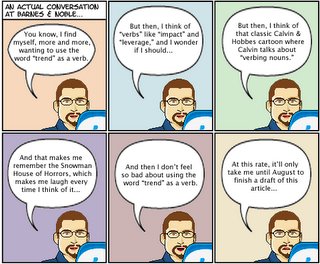 Cartoon from Collin Vs. Blog at http://wrt-brooke.syr.edu/cgbvb/archives/comics/
Cartoon from Collin Vs. Blog at http://wrt-brooke.syr.edu/cgbvb/archives/comics/
click to enlarge
Allen, G. (2000). Intertextuality. London: Routledge.
Aragay, M. (2005). Books in Motion. Adaptation, Intertextuality, Authorship. Rodopi Publishing.
Baumann, R. (2004). A World of Others' Words: Cross-Cultural Perspectives on Intertextuality. Blackwell.
Bazerman, C. (2004). 'Intertextualities: Volosinov, Bakhtin, Literary Theory, and Literacy Studies' in Bakhtinian Perspectives on Languages, Literacy, and Learning. Ed. A. Ball & S. W. Freedman. Cambridge University Press, 2004: 53-65.
Online at http://www.education.ucsb.edu/%7Ebazerman/35.intertextualities
Bazerman, C. (2004). 'Intertexuality: How Texts Rely on Other Texts' in Bazerman, C. and Prior, P. eds. What Writing Does and How It Does It: An Introduction to Analyzing Texts and Textual Practices. New Jersey: Lawrence Erlbaum.
And other papers in this volume.
Bell, A. (1991). The Language of News Media. Oxford, Blackwell.
Bloom, D. and Shuart-Faris, N. (2004). Uses of Intertextuality in Classroom and Educational Research. Information Age.
Briggs, C. and Baumann, R. (1992). 'Genre, Intertextuality and Social Power.' Journal of Lingusitic Anthroplogy, 2: 131-172.
Compagnon, A. (1979). La Seconde Main, ou le Travail de la Citation. Editions du Seuil.
Derrida, J. (1972). 'Signature Evenement Contexte' in Marges de la Philosophie. In Kamuf, P. ed. (1991). A Derrida Reader. New York: Columbia University Press.
Devitt, Amy. (1991). 'Intertextuality in Tax Accounting: Generic, Referential, and Functional.' Textual Dynamics of the Professions: Historical and Contemporary Studies of Writing in Professional Communities. Eds. Charles Bazerman and James Paradis. Madison: U of Wisconsin. P. 336–57.
El-Bisi, J. (2008). Critical Intertextuality. VDM Verlag.
Fairclough, N. (1992). Discourse and Social Change. Polity Press.
Chapter 4 'Intertextuality'.
Francois, F. (1998). Le Discours et ses Entours. Paris: L'Harmattan. Reprise-modification.
Francois, F. (2005). Interpretation et Dialogue Chez des Enfants et Quelques Autres. Lyon: ENS Editions.
Genette, G. (1992). The Architext: an Introduction. University of California Press.
Genette, G. (1998). Palimpsests. University of California Press.
Giltrow, J. (2001). 'Vagrant Voices: Summary, Citation, Authority'. Technostyle, 17,1.
Giltrow, J. and Lukmani, Y. (2004). 'Citation and "Difference"'. Paper presented at the CCCC conference, San Antonio.
Gunther, S. (1999). 'Polyphony and the 'layering of voices' in Reported Dialogue: an Analysis of the Use of Prosodic Devices in Everyday Reported Speech' in Journal of Pragmatics, 31 (5): 685-708.
Hengst, J. and Miller, P.J. (1999). 'The Hetrogeneity of Discourse Genres: Implications for Development'. World Englishes, 18 (3): 325-341.
Hicks, D. (1989). 'The Voices Within Narratives: the Development of Intertextuality in Young Children's Stories.' Discourse Processes, 12: 329-51.
Iedema, R. (2001). Resemioticization. Semiotica 137 (1): 23-39.
Ivanic, R. (2004). 'Intertextual Practices in the Construction of Multimodal Texts in Inquiry-based Learning' in Shuart-Faris, N. and Bloome, D. eds.
Hyland, K. (1999). 'Academic Attribution: Citation and the Construction of Disciplinary Knowledge'. Appplied Linguistics, 20,3: 341-367. Also chapter 2 in Disciplinary Discourses (see Academic Literacies).
Ivanic, R. (1998). Writing and Identity: The Discoursal Construction of Identity in Academic Writing. Amsterdam: John Benjamins. Chapter 2 and 7.
Kamberelis, G. and Danette Scott, K. (1992). 'Other People's Voices: the Coarticulation of Texts and Subjectivities'. Linguistics in Education, 4: 359-403.
Klooss, W. ed. (1998). Across the Lines.Intertextuality and Transcultural Communication in the New Literatures in English. ASNEL Papers. Rodopi bv Editions.
Kristeva, J. (1984). Revolution in poetic language. New York: Colombia University Press.
Lemke, J. (1992). 'Intertextuality and Educational Research'. Lingusitics in Education, 4: 257-267.
Linell, P. (1998). Approaching dialogue: Talk, interaction and contexts in dialogical perspectives. Amsterdam & Philadelphia, PA: John Benjamins.
Linell, P. (1998). 'Discourse across boundaries: On recontextualization and the blending of voices in professional discourse.' Text, 18: 143-157.
Lucy, J. (ed). (1993). Reflexive Language: Reported Speech and Metapragmatics. New York, Cambridge University Press.
Maisonnat, C. et al (2009). Rewriting/Reprising in Literature: The Paradoxes of Intertextuality. Cambridge Scholars.
Maybin, J. (2000). 'The New Literacy Studies: context, intertextuality, discourse' in Barton, D. et al. eds. Situated Literacies. London: Routledge. (Also on Bakhtin and the NLS).
Mayes, P. (1990). 'Quotation in Spoken English'. Studies in Language, 14,2: 325-363.
Meinhof, U. (2001). Intertextuality And The Media (From Genre To Everyday Life). Manchester University Press.
Moore Howard, R. (1999). Standing in the Shadow of Giants: Plagiarists, Authors, Collaborators. Ablex Publishing. Review by Joel Bloch.
Myers, G. (1999). 'Functions of Reported Speech in Group Discussions'. Applied Linguistics, 20,3: 376-401.
Myers, G. (1999). 'Unspoken Speech: Hypothetical Reported Discourse and the Rhetoric of Everyday Talk' in Text, 19 (4): 571-90.
Norris, S. and Jones, R. (eds) (2005). Discourse in Action: Introducing Mediated Discourse Analysis. London, Routledge.
Orr, M. (2003). Intertextuality: Debates and Contexts. Polity Press.
Pennycook, A. (1996). 'Borrowing other’s words: Text, ownership, memory, and plagiarism'. TESOL Quarterly, 30: 201-30.
Also in 'Negotiating Academic Literacies'.
Prior, P. (1994). 'Response, Revision, Disciplinarity: a Microhistory of a Dissertation Prospectus in Sociology' in Written Communication, 11 (4): 483-533.
Prior, P. (1995). 'Tracing Authoritative and Internally Persuasive Discourse: a Case Study of Response, Revision, and Disciplinary Enculturation'. Research in the Teaching of English, 29 (3): 288-325.
Prior, P. (2001). 'Voices in Text, Mind and Society: Sociohistoric Accounts of Discourse Acquisition and Use' in Journal of Second Language Writing, 10 (1/2): 55-81.
Prior, P. and Hengst, J. (?). 'Exploring Reformulation as Multimodal Discourse Practice' in Recherches Lingusitiques, 29.
Prior, P., Hengst, J. and Roozen, K. (2006). '‘I’ll be the Sun’: From Reported Speech to Semiotic Remediation Practices'.Text and Talk, 26.6.
Sherman, J. (1992). Your own thoughts in your own words. ELT Journal, 46: 190-198.
Shuart-Faris, N. and Bloome, D. (2004). Uses Of Intertextuality In Classroom and Educational Research. Information Age Publishing.
Wertsch, J.V. (1991). Voices of the mind: A sociocultural approach to mediated action. Cambridge, Mass.: Harvard University Press.
Woodmansee, M. and Jaszi, P. (1994). The Construction of Authorship: Textual Appropriation in Law and Literature. Duke University Press.
Worton, M. and Still, J. eds. (1990). Intertextuality: Theories and Practices. Manchester University Press.
Chapter 3 by Riffaterre, M. 'Compulsory Reader Response: the Intertextual Drive'.